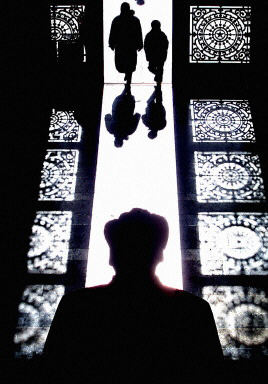Feb 10, 2005
| | |||
| | ||||
The Chinese Communist Party organizations permeate Chinese life, managing everything and firmly controlling Chinese society, by using government offices as facades. The photo is taken in the shadow of a stature of Mao Zedong in Beijing's Military Museum on March 24, 2000. (AFP Photo)
The U.S. headquarters of the World Organization to Investigate the Persecution of Falun Gong (www.upholdjustice.org) published an investigative report on January 28, exposing in detail how the Chinese Communist Party (CCP) controls the Chinese government and how Party organizations cling closely to the government apparatus, as if the government was the Party's puppet, completely losing its independent dignity and position of trust to the people.
Party's Political and Judicial Commission Manipulates the Chinese Judicial System
The report pointed out that the CCP directly or through the government apparatus controls China in three ways:
First, the corresponding departments of the CCP directly control governmental departments in performing their daily functions. A typical case is the judicial system. China's judicial system, which includes Public Security, the Procuratorate (prosecutors) and the courts, must conform to directions from the Political and Judicial Commission of the Party. The greatest barrier to judicial independence in China is the Political and Judicial Commission that represents the leadership of the party.
In particular, cases involving dissidents, non-governmental religious groups and Falun Gong are all decided by the Political and Judicial Commission of the party as to who to arrest, who to sentence and length of sentence. The court merely reads the verdict. (Gestapo-like 610 Offices were set up to persecute Falun Gong and are managed by party committees at each level of government, most of which are controlled by the party's Political and Judicial Commission.)
As discussed in The Epoch Times editorial series, "Nine Commentaries on the Chinese Communist Party," executive-branch officials are always subordinate to party officials and each government office takes orders from its corresponding level party organization; this phenomenon and mechanism is like a "strange possessing structure."
CCP and State Government are Symbiotic
The second means is a dual management system. In other words, there are two nameplates in every organization, but only one is visible to the public. The party's central organization clings to the government's State Council organization like a parasite. The party must control this important level of government, but must use the name of the Chinese government to conceal and confuse the public. Organizations requiring such a high level of oversight include, among others, the following:
The State Council Ministry of Supervision and the CCP Central Committee Disciplinary Inspection Committee share the same office; the organization is listed under the State Council, and reports directly to the Central Committee of the CCP;
The State Council Taiwan Affairs Office and the CCP Central Committee Taiwan Works Office;
The State Council Press Office and the CCP Central Committee Foreign Propaganda Office;
The State Council Cult Prevention and Management Office and the CCP Central Falun Gong Directive Group Office (i.e. Central 610 Offices);
Among these, nos. 2, 3 and 4 are one organization with two names; they are listed as being directly under the CCP Central Committee. These organizations operate without interference from the State Council. The party completely controls all levels of these governmental systems.
The Party's Mouthpiece: State Controlled Media
The third method of control is media control. In a civilized society, the media functions as an independent and objective forum for the public. However, in Mainland China, it has deteriorated into the Party's mouthpiece and is directly controlled by the party.
In mainland China, the central level public media (not including the party's internal publications) mainly include: Xinhua News Agency (Xinhua Net), China News Agency (Zhongxin Net), Chinese net (Chinese Internet News Center), China Central Television (CCTV), People's Daily (People's Net), and Guangming Daily, to name a few.
According to the CCP's official statement, the Xinhua News Agency is the party's and country's "source of information and mouthpiece." It is considered China's largest news information gathering and dissemination center, and is considered one of the top four news agencies in the world. It shoulders "the honorable duty of guiding domestic public opinion, and effectively influencing the world's opinion."
The People's Daily is the CCP Central Committee's official newspaper. It belongs solely to the CCP Central Committee. The Guangming Daily is identified as "a nationwide and comprehensive party newspaper that has a foothold in intellectual circles and engages society."
In August 2000, when accepting an interview by Michael Wallace, the host of CBS's 60 Minutes, former Chinese leader, Jiang Zemin said, "The media should be the party's mouthpiece." On December 5, 2003, Chinese President Hu Jintao stressed at the National Propaganda and Ideological Operations conference that, "The party manages and propagandizes the party's ideology," which is the party's cardinal principle and system, and, "We must always firmly persist, and not vacillate at any moment."
Along with the development of the Internet, the CCP has placed an extremely high priority on the control of Internet public opinion in recent years. On July 24, 2000, the Assistant Editor-in-Chief, Sun Yusheng, of the CCT announced that the five largest websites supported by the CCP Central Committee are: the People's Daily website, Xinhua News Agency's Xinhua Net, the China Daily website, the China Radio International website, and the Chinese Internet Center. Five other large websites that must strengthen the level of their propaganda are: the Shanghai Eastern Net, Beijing Gianlong Net, Zhongging Net, CCTV Website and the Central People's Broadcasting Station Website.
http://english.epochtimes.com/news/5-2-10/26350.html
Category: Falun Dafa in the Media






